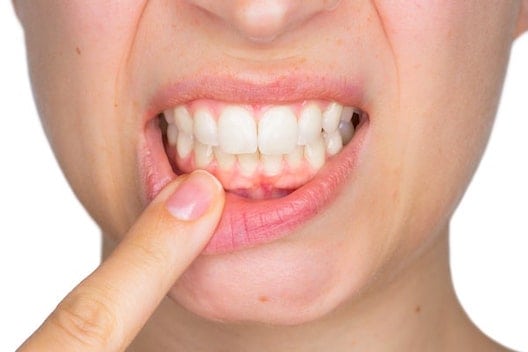Gum Disease
Inflammation of the gum caused by bacteria which have not been cleaned away by routine oral hygiene techniques is called gingivitis or gum disease. This inflammation is relatively common and can usually be resolved relatively quickly.
Typical symptoms of gum disease are redness, swelling and bleeding of the gums especially after brushing or flossing but sometimes even spontaneously where patients might report blood on their pillow in the morning. This bleeding can also be associated with pain, teeth sensitivity and bad breath (halitosis).
Causes of gum disease
The usual cause is poor oral hygiene, specifically, a lack of efficient brushing, flossing or other interdental cleaning methods.
Smoking can also cause gum disease as the toxic effect of tobacco smoke reduces the blood supply to the gum tissue, starving it of oxygen and other nutrients causing necrosis (death) of this tissue and ultimately recession of the gum.

Long term impact of gum disease
If gum disease goes untreated, then eventually, as with the effects of smoking the gum tissue dies and recedes. The bacteria that caused the gums to be inflamed can then infect the gum, spread into the jaw bone and begin eroding the bone surrounding the tooth.
This condition is called periodontitis and can eventually lead to the tooth becoming loose and ultimately lost. Generally, this is how people lose their teeth over the longer term if gum disease is not treated.
Gum disease treatments
Once the diagnosis is confirmed, treatment usually begins with regular in-depth cleaning sessions with the dental hygienist.
The hygienist will, in turn, give advice and instruction on how best to keep the mouth clean at home in between visits. This advice often comprises switching to an electric toothbrush, regular interdental cleaning with either floss or interdental brushes and the use of specific antibacterial mouthwashes or gels.
If the condition is acute, antibiotics may be needed as part of a full mouth disinfection.
It would be advisable that smokers consider giving up the habit to help maintain the long-term health of the gums and teeth.
Our Gum Disease Experts
Frequently Asked Questions about Gum Disease in Bayswater W2, West London:
What is gum disease, and what causes it?
Gum disease, also known as periodontal disease, is an inflammatory condition that affects the gums and supporting structures of the teeth. It is primarily caused by plaque buildup, poor oral hygiene, and certain risk factors such as smoking, diabetes, and genetics.
What are the signs and symptoms of gum disease?
Common signs and symptoms of gum disease include red, swollen, or bleeding gums, persistent bad breath, receding gums, loose teeth, and changes in the way your teeth fit together when you bite.
How is gum disease diagnosed?
Gum disease is diagnosed through a comprehensive dental examination, which may include probing the gums to check for pocket depth, dental X-rays to assess bone loss, and other diagnostic tests.
Can gum disease be reversed or cured?
In its early stages (gingivitis), gum disease can often be reversed with professional dental cleanings and improved oral hygiene habits. However, in more advanced stages (periodontitis), gum disease can be managed but not cured.
What are the consequences of untreated gum disease?
Untreated gum disease can lead to serious complications, including tooth loss, bone loss, gum recession, and systemic health issues such as heart disease, diabetes, and respiratory infections.
How is gum disease treated?
Treatment for gum disease depends on the severity of the condition. It may include professional dental cleanings (scaling and root planing), antibiotics, surgical procedures such as flap surgery or gum grafting, and ongoing maintenance therapy.
Can gum disease be prevented?
Yes, gum disease can be prevented with good oral hygiene habits, including brushing your teeth twice a day, flossing daily, using antimicrobial mouthwash, eating a balanced diet, avoiding tobacco use, and scheduling regular dental check-ups and cleanings.
Is gum disease linked to other health conditions?
Yes, research has shown a strong association between gum disease and other systemic health conditions, including heart disease, stroke, diabetes, respiratory infections, and pregnancy complications. Managing gum disease is essential for overall health.
What role does genetics play in gum disease?
While genetics can increase the risk of developing gum disease, it’s not the sole determinant. Even individuals with a genetic predisposition can reduce their risk by practising good oral hygiene and seeking regular dental care.
How can I schedule a periodontal evaluation for gum disease in Bayswater W2, West London?
To schedule a periodontal evaluation or discuss treatment options for gum disease, you can call us on 020 7229 8716, email us at info@gardensquaredental.co.uk, or click on the button below to contact us. Our experienced dental team will provide personalised care to help you achieve optimal gum health.



